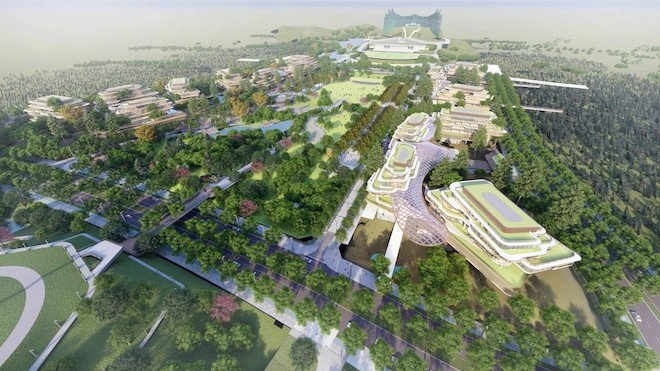Indonesia is striving to make its new capital in East Kalimantan in Borneo a model city to help in the transition to net zero, achieve climate resilience, and ensure economic prosperity for all, said Nusantara National Capital Authority Chairman Bambang Susantono.
“The future is urban,” he said in his keynote at the Asian Development Bank's (ADB) recently concluded Southeast Asia Development Symposium as he elaborated on plans to make the new capital a model for other cities amid the challenges of rapid urbanization.
According to UN-Habitat, 55% of the world’s population lives in cities, with the number expected to rise to 70% by 2050. Poorly planned and managed cities can lead to inequalities, with residents fighting over limited resources, public services, and inadequate infrastructure. “If steered and deployed correctly, urbanization can help the world overcome some of its major global challenges including poverty, inequality, environmental degradation, climate change, fragility and conflict,” said UN-Habitat.
As part of plans to make the new capital a model city, Susantono said Indonesia is joining the global movement in aligning Nusantara’s development with the Sustainable Development Goals (SDGs). “Nusantara will be the first city in Indonesia that conducts a systematic tracking and review of SDGs,” he said.
His office plans to track and report on SDG progress in the new capital and will conduct a voluntary local review (VLR). Local and regional governments worldwide conduct VLRs to track and report on SDG progress. UN-Habitat views VLRs as powerful accelerators of the process of localizing the SDGs.
Major endeavor
Susantono said Nusantara, which is also envisioned to be the first carbon-neutral city in Indonesia by 2045, is not the usual city building project.
The capital will have a total land area of more than 256,000 hectares, making it 4 times and 3.5 times larger than Jakarta and Singapore. Under the government’s plan, only 25% or about 56,000 hectares will be developed as a green built-up urban area, including an area of around 6,600 hectares to be designated as the government core area.
“It is a major endeavor to create a model city that is green, smart, inclusive, resilient, and sustainable—a model that can be replicated by other new and existing cities around the globe and allow us to transition to net zero, achieve climate resilience, and ensure economic prosperity for all,” said Susantono.
The government also wants Nusantara to be part of the global agenda in conserving biodiversity, with its plans to revive the flora and fauna in Kalimantan. This aligns with plans to make the capital a sustainable forest city. The Nusantara National Capital Authority is currently working with international organizations to develop a biodiversity baseline and conservation strategy which will guide the development process.

Sustainable and smart planning
Under the development plan the for new capital, about 65% of the land area will be transformed into a tropical forest through reforestation. The government also plans to deploy nature-based solutions to ensure forest areas act as a carbon sink and to increase water absorption and reduce flood risks.
The new capital is also designed to be a smart city, and will deploy technology not only to enhance quality of living, but also to control the green urban environment. This includes deploying an integrated system to ensure efficient use of water and electricity from clean energy sources, and smart and modern transport modes with minimal or zero emissions.
To ensure the city is carbon neutral by 2045, the government announced that ADB would conduct a scoping study to help it identify, track, neutralize, and reduce carbon emissions.
Susantono said the project has received support from national and international organizations. In partnering with these institutions, “Nusantara can quickly gain international best practices, exchange knowledge, and allocate resources more effectively to achieve our net-zero goal,” he said. "We welcome these partners to making Nusantara a living laboratory where… we work together to generate new knowledge and also explore different kinds of opportunities on creating a new way of living, working, and learning.”
He said the project is a critical component of Indonesia 2045, which envisions the country becoming high income on its centennial.
This story was first published by BIMP-EAGA on 27 April 2023.

